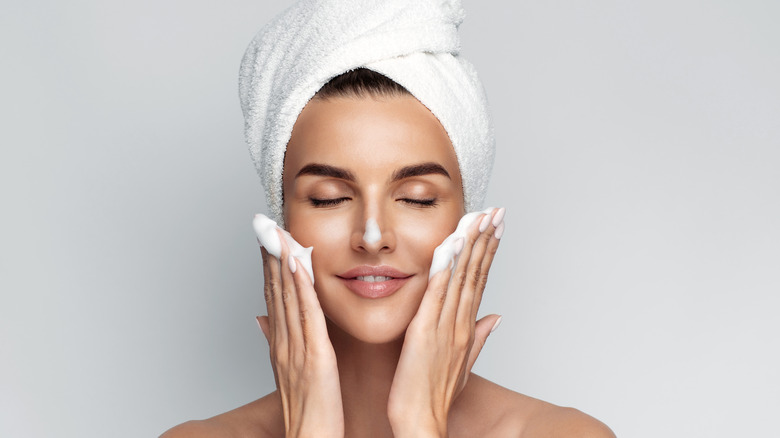The Real Reason You Shouldn't Buy St. Ives Skin Care Products
The St. Ives skin care brand, which can be found in almost any grocery store or drug store across the country, is incredibly popular for its low-cost, deliciously scented products. St. Ives makes products ranging from body wash to facial toner, but one of its most well-known products is the Fresh Skin Apricot Scrub, which has a cult following that includes celebrities like Jennifer Lawrence and Gigi Hadid, (via Total Beauty).
Fans of St. Ives facial scrubs love the way the gritty-textured product exfoliates their skin and leaves it feeling smooth and clean. Manually-exfoliating scrubs like St. Ives Apricot Scrub contain granular substances that can help unclog pores and slough off dead skin, (via Healthline).
While brands like Neutrogena and Aveeno have previously come under fire for using water-polluting, plastic microbeads as exfoliants, fans of St. Ives praised the brand for using natural, ground-up walnut shells in their exfoliating scrub, (via Refinery29).
But even though walnut shells aren't harmful for the environment, they can cause damage to your skin.
St. Ives apricot scrub's walnut shell-based exfoliant may be too harsh for your skin
Many dermatologists and estheticians are not fans of St. Ives exfoliating scrubs because they are too harsh for your skin. In 2016, a lawsuit was filed against St. Ives that claimed that the crushed walnut shells used in its scrubs were actually causing damage to users' skin,(via Glamour). Though the lawsuit was thrown out in 2018, it called attention to the potential harm caused by the brand's harsh exfoliants.
Crushed walnut shells have sharp, jagged edges that can cause microtears due to physical abrasion when you use them to scrub your face. Although your skin might feel baby-smooth when you pat it dry, microtears can cause your skin to become more sensitive, and leave it dry, flaky, and red. Over time, this can reduce your skin's ability to heal itself and accelerate your skin's aging process.
Instead of nut-based manual exfoliants, Chicago-based dermatologist Dr. Faiyaaz Kalimullah recommends chemical exfoliants. "Rather than physically scraping off the top layers of skin, these products use mild chemical solutions to gently exfoliate the skin," Dr. Kalimullah told The List.
Dr. Kalimullah recommends that you look for chemical exfoliants that contain glycolic acid, which is an alpha hydroxy acid (AHA) that is found in milk and fruit sugars. "AHAs like glycolic acid have the added benefit of being collagen stimulators that can help reduce the appearance of fine lines and wrinkles," noted Dr. Kalimullah.

